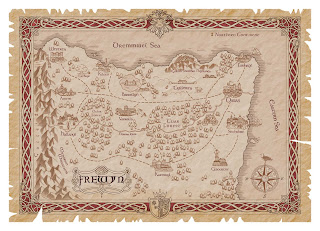Story for the Day: Maremeadow Farm
Part of the newest book, coming to you on our Patreon page at the end of the month:
Maremeadow Farm was reckoned the safest place for rearing horses, completely closed off from wolves and thieves, the accoutrements around the farm fashioned in Eithne’s image, and iron iteration of her hooves marking the lintel of every door, her features surveying the extensive grounds, the long braids of sweetgrass attached to the charm bearing her likeness carried in pockets and hung over pens. There was a longstanding dispute as to whether there was magic in Frewyn, the local population claiming that miraculous circumstances were merely the work of the Gods, and the foreign population declaring that anyone who could heal wounds by touching them and tame horses by speaking to them must be charmed by some power at least. Magic often happened in Frewyn, though Frewyn hardly noticed, their hands always busy with business, with farming and crafting work taking up much of their time. Their clerics healed the ailing, their wisewomen made teas and tinctures, and whether they offered tribute to Fuinnog, the God of the Sky and Warden of the Weather, for timely rains, or said a prayer to Chune, Goddess of Bounty and the Harvest, and suddenly found their cows in milk again, it was all attributed to their manner of secular devotion and their good sense which told them, ‘things that ought to happen would happen anyway’. This crowned Frewyn as a traditional society that considering magic a tradition, the Children of the Gods inheriting a land that would offer everything they needed, provided they work for it. Craftsmen and farmers of every distinction dotted the landscape, their abilities and devotion to their work the pride of the realm, its farms and estates laid out across a patchwork of tellurian constellations, marked by waddle walls and pointed fences, the paddocks and pasture of a land at the height of cultivation, the wheat and rye ornamenting the fields in a numinous haze, the harvest of a nation heartened for a long winter a magic in itself.
It was late summer, and the first of the corn and hay were taking in across the Varrallan farms, the barns and stables cleaning out while their inmates were grazing in the fields. Lines of freshly cut hay garlanded the short grass, the farmers and hands marching down the rows, their scythes flourishing in broad strokes, decapitating the brome and fescue, leaving the freshly cut stalks to apricate under the power of a hot sun. The last of the corn was taking in, the ripened oat waving their flags and the barley bowing its ears, the golden wheat cutting down and taking up for threshing and winnowing. The greenfinch and chaffinch sang to the sun, their aubades accompanying the shepherds to the meadows, following close behind their flocks, their dogs loping along beside their charge. Horses tittuped on the neighbouring hills, perlustrating the farmers at their work, their riders and tamers allowing them full command of the view, the fulmination of abundance blooming about the track. A thin veil of mist hung on the horizon, the changeable weather of late summer worrying many a farmer, some eager to make their bales and ricks as quickly as possible, the slight coolness in the breeze an intimation of summer’s end. The husbandmen crowded the morning market, hawking ovine and bovine, the traders from Farriage eager to find a prized bit of beef or mutton to take back to northern tables, the poulterers suffering under a profusion of eggs, their coops and clutches too numerous to be made much of.
Here, amongst the sedge and rush of the open plains, sat Maremeadow, an acreage tamed and tended by a few famers and hands, replete with great hall and lodgings, forge and tannery, barn and stables, the whole of the land crowned by an old farmhouse, planted on the northern rise, the straw thatch trimmed and pinned with hazel in the old style, the surrounding point fence done in white oak, the stone newly washed with slake lime, the blue shutters and doors hooked with iron slats. It was a small working estate, the buildings along the northern slope like a village trying to climb a hill, the land sweeping downward from the house, the windows bearded by flower boxes, hedges of buckthorn and yew marking out the path leading to the field, the garden beside overblown with summer blooms, the lavender and rosemary offering their scents to the breeze. The Dehir forest predominated the distance, a copse of chestnut trees delineating where cultivation ended and the wilds began, a few dry stone walls etched out the grazing ground and divided the stables and barn, a small fell of coppice rested behind the workshop, sentinels of silver birch hid behind the house, and a stand of crimson spire oaks laureated the brow of the hill, where the geldings and yearlings flattened the path with their rataplan gait. Here was magic, if anywhere: a farm at the crest of the year, the whole surrounded by the splendour of summer, the robins chirming their seasonal elegies, their crooning carrying across the southern planes.


Comments
Post a Comment